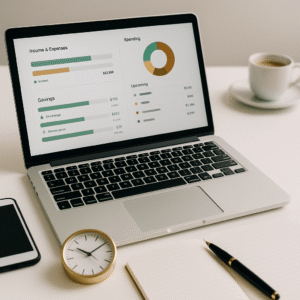How I Built a Money System That Works With Inconsistent Income
Introduction
When I started freelancing, I assumed the hardest part would be finding clients. It wasn’t. The real challenge was figuring out how to manage money when it didn’t arrive at the same time — or in the same amount — each month.
No one really prepares you for how much unpredictable income affects the way you think, save, and make decisions. I didn’t need a complex spreadsheet or a financial advisor. Instead, I needed a flexible system that worked in real life, not just on paper.
Here’s what finally helped.
1. I Built a Baseline Budget Around My “Low Months”
Rather than budgeting based on my best income months, I flipped the approach. I looked back at my lowest three or four months from the past year and used that number as my baseline.
That amount became my safe monthly budget — rent, bills, essentials, and minimal extras. When I earn more than that, I don’t immediately upgrade my lifestyle. Instead, I treat the extra as buffer room, not bonus cash.
As a result, my spending habits stay steady, and I avoid the stress of constantly adjusting to income swings.
2. I Created a Buffer Fund (Before Anything Else)
Before diving into long-term saving or investing, I focused on one thing: building a basic buffer. My first goal was one month of freelance expenses — then I aimed for two.
That fund now covers me when client payments are delayed, work slows down, or I want a break. Over time, it’s become less of an emergency stash and more of a built-in support system.
Although it started small, that buffer now gives me flexibility I didn’t have before.
3. I Separate Business and Personal Money
At first, I used one account for everything. Payments came in, bills went out, and I tried to keep track mentally. Unsurprisingly, that didn’t last long.
Eventually, I created one account for income and business tools, and another for personal use. Now, once a month, I “pay myself” from my business account — just like a salary.
That change alone made everything cleaner, simpler, and easier to manage.
4. I Use Systems, Not Willpower
I used to try to remember everything — when to send invoices, how much to move into savings, and when to check my spending. But willpower wears thin.
That’s why I set up a few systems. Invoices go out on a schedule. My budget app updates in real time. Small transfers into savings happen weekly, without needing input from me.
Because it’s automated, I don’t have to stay perfectly disciplined. The system keeps running, even when I’m focused on work or rest.
Final Thoughts
Freelance income isn’t broken — it’s just different. Once I stopped forcing a traditional budget into a nontraditional lifestyle, I felt more confident and less anxious.
Now I know what I can spend, what I need to earn, and what I can adjust if work slows down. I’m not guessing anymore — I’m responding with a system that reflects how I actually live and earn.
You don’t have to micromanage every dollar. You just need a rhythm that works with the way money shows up for you.








